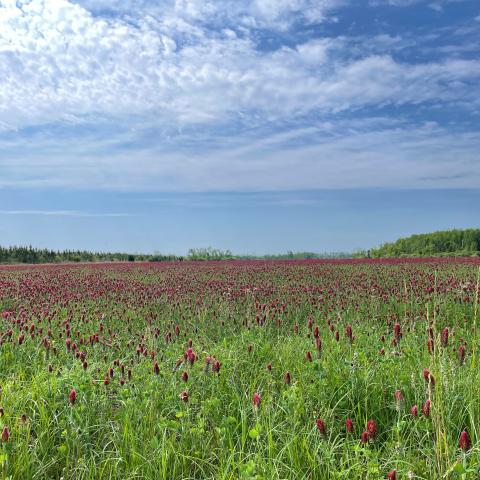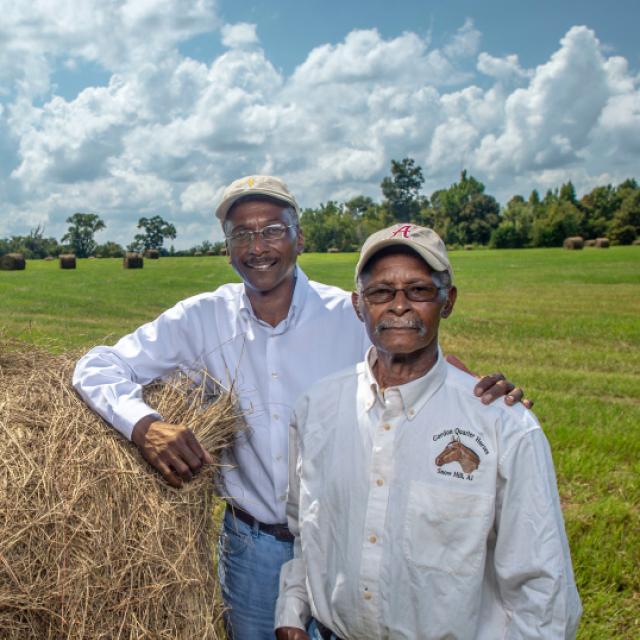
News

Conservation Innovation Grants (CIG) is a competitive program that supports the development of new tools, approaches, practices, and technologies to further natural resource conservation on private lands.
Through creative problem solving and innovation, CIG partners work to address our nation's water quality, air quality, soil health and wildlife habitat challenges, all while improving agricultural operations.
There are three annual Conservation Innovation Grants funding opportunities:
National competition for projects that support the early-stage development and piloting of new tools, practices and technologies to further natural resource conservation on private lands.
National competition for projects that support more widespread adoption and evaluation of innovative conservation approaches in partnership with agricultural producers. On-Farm Trials Awardees provide technical assistance and incentive payments to producers to help compensate for risks associated with implementation of new conservation practices, systems and approaches. Awardees also evaluate the environmental, financial and social (to the extent possible) impacts of implementing innovative approaches. The Soil Health Demo Trial is a priority within the On-Farm Trials competition which focuses exclusively on implementation of conservation practices and systems that improve soil health.
State-level competitions for projects that support early-stage development and piloting of new tools, practices and technologies to further natural resource conservation on private lands. While the overall goal and approach match those of CIG Classic, CIG state competitions fund projects that target state-identified conservation priorities. Each year, NRCS state offices may elect to administer their own CIG competitions. State CIG competitions are announced separately from national competitions.

Since its inception in 2004, CIG has funded hundreds of projects, boosting natural resource conservation while helping producers improve the health of their operations for the future.

Information for applicants on the CIG program and how to apply.

Information for grantees who have been awarded funding for a CIG project.

CIG is making an impact across the country
CIG are competitive grants that drive public and private sector innovation in resource conservation. CIG projects inspire creative problem-solving that boosts production on farms, ranches, and private forests - ultimately, they improve water quality, soil health and wildlife habitat.
Conservation Innovation Grant (CIG) projects are expected to lead to the transfer of conservation technologies into NRCS standards and practices. Florida NRCS offers CIG state program funding opportunities to stimulate the development and adoption of innovative conservation approaches and technologies in conjunction with agricultural production. Florida NRCS CIG has a total of 11 projects as of FY 2023.
Cattle graze at Blackbeard Ranch, Florida. - NRCS CIG Project
State and National CIG: All United States (U.S.) based, non-Federal entities (NFE) and individuals are eligible to apply for projects carried out in the U.S. All CIG projects must involve EQIP-eligible producers.
On-Farm Trials: Private entities whose primary business is related to agriculture, non-governmental organizations with experience working with agricultural producers, and non-Federal government agencies.
National Competition: A CIG funding notice is announced each year. Funds for single- or multi-year projects, not to exceed three years, are awarded through a nationwide competitive grants process. Projects may be watershed-based, regional, multi-state or nationwide in scope. The natural resource concerns eligible for funding through CIG are identified in the funding announcement and may change annually to focus on new and emerging, high priority natural resource concerns.
On-Farm Trials: Up to $25 million annually is available for On Farm Trials, which support widespread adoption of innovative approaches, practices and systems on working lands. On-Farm Trials projects feature collaboration between NRCS and partners to implement on-the-ground conservation activities and then evaluate their impact. Incentive payments are provided to producers to offset the risk of implementing innovative approaches.
Florida CIG Priorities:
All CIG applications must be submitted on grants.gov. The grants.gov electronic submission interface is called Workspace. Workspace is the standard way for organizations or individuals to apply for federal grants in grants.gov. Workspace allows an applicant grant team to access and edit different forms within an application simultaneously. In addition, the forms may be filled out online or as a PDF. Please allow extra time to register in Workspace because there are several preliminary registration steps before an applicant can submit the application.
To register, go to grants.gov, click on “Applicants”, then click on “Get Registered.” If you have completed a prior grants.gov application, you may already have completed the registration process. Persons with disabilities who require alternative means for communication (e.g., Braille, large print, or audio tape) should contact the USDA TARGET Center at 202-720-2600 (voice and TDD).
For technical issues with Grants.gov, contact Grants.gov Applicant Support at 1-800-518-4726 or support@grants.gov. Awarding agency staff cannot support applicants regarding Grants.gov accounts.
Hilary Barnhart
Assistant State Conservationist for Partnerships & Initiatives
Email: hilary.barnhart@usda.gov Mobile: (850) 633-7204
NRCS has established a webinar series to allow employees, partner conservationists and other interested stakeholders to hear directly from CIG grantees.
General information about the CIG program, who is eligible and how to apply.
CIG provides special consideration and benefits to Historically Underserved applicants and projects that support Historically Underserved producers.
The 2021 Congressional report briefly describes the history of CIG and how the program is managed.
Contact your local service center to start your application.
Do you farm or ranch and want to make improvements to the land that you own or lease?
Natural Resources Conservation Service offers technical and financial assistance to help farmers, ranchers and forest landowners.

To get started with NRCS, we recommend you stop by your local NRCS field office. We’ll discuss your vision for your land.
NRCS provides landowners with free technical assistance, or advice, for their land. Common technical assistance includes: resource assessment, practice design and resource monitoring. Your conservation planner will help you determine if financial assistance is right for you.
We’ll walk you through the application process. To get started on applying for financial assistance, we’ll work with you:
Once complete, we’ll work with you on the application, or CPA 1200.
Applications for most programs are accepted on a continuous basis, but they’re considered for funding in different ranking periods. Be sure to ask your local NRCS district conservationist about the deadline for the ranking period to ensure you turn in your application in time.
As part of the application process, we’ll check to see if you are eligible. To do this, you’ll need to bring:
If you don’t have a farm number, you can get one from USDA’s Farm Service Agency. Typically, the local FSA office is located in the same building as the local NRCS office. You only need a farm number if you’re interested in financial assistance.
NRCS will take a look at the applications and rank them according to local resource concerns, the amount of conservation benefits the work will provide and the needs of applicants. View Application Ranking Dates by State.
If you’re selected, you can choose whether to sign the contract for the work to be done.
Once you sign the contract, you’ll be provided standards and specifications for completing the practice or practices, and then you will have a specified amount of time to implement. Once the work is implemented and inspected, you’ll be paid the rate of compensation for the work if it meets NRCS standards and specifications.